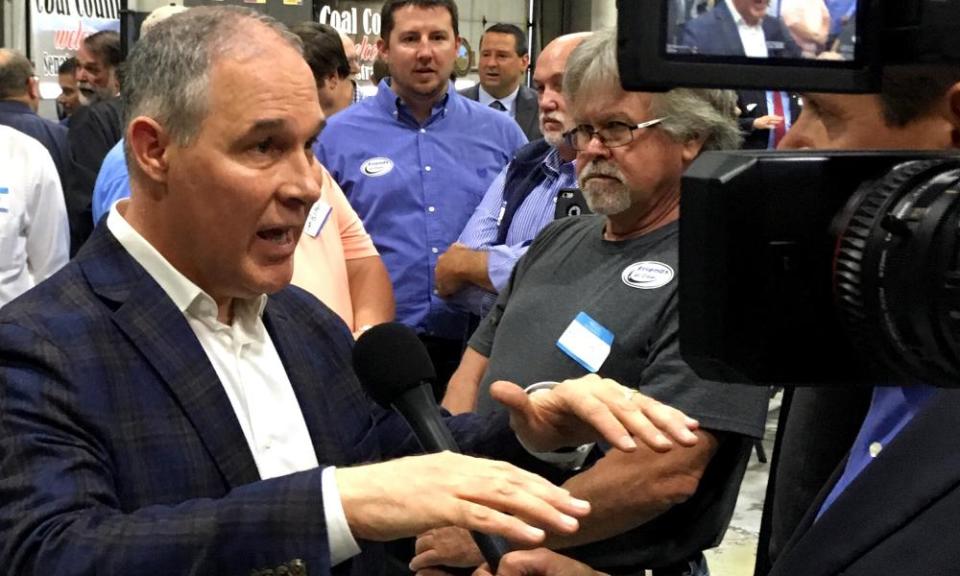'The war on coal is over': EPA boss to roll back Obama's clean power rules
Scott Pruitt says he will sign rule withdrawing policy on Tuesday
Plan imposed restrictions on emissions from coal-fired power stations

The head of the Environmental Protection Agency said on Monday that he would sign a new rule overriding the Clean Power Plan, an Obama-era effort to limit carbon emissions from coal-fired power plants.
“The war on coal is over,” EPA administrator Scott Pruitt declared in the coal mining state of Kentucky, at an event with one of the state’s US senators, the Senate majority leader, Mitch McConnell.
For Pruitt, getting rid of the Clean Power Plan will mark the culmination of a long fight he began as the elected attorney general of Oklahoma. Pruitt was among about two dozen attorney generals who sued to stop Barack Obama’s push to limit carbon emissions.
Closely tied to the oil and gas industry in his home state, Pruitt rejects the consensus of scientists that emissions from burning fossil fuels are the primary driver of global climate change.
Donald Trump, who appointed Pruitt and shares his skepticism of established climate science, promised to kill the clean power plan during the 2016 campaign as part of his broader pledge to revive the nation’s struggling coal mines.
In his order on Tuesday, Pruitt is expected to declare that the Obama-era rule exceeded federal law by setting emissions standards that power plants could not reasonably meet.
Appearing at Whayne Supply, a Hazard, Kentucky, company that sells coal mining supplies, Pruitt said: “The EPA and no federal agency should ever use its authority to say to you: we are going to declare war on any sector of our economy.”
Whayne Supply has laid off about 60% of its workers in recent years. While cheering the demise of the clean power plan as a way to stop the bleeding, McConnell conceded most of those lost jobs are never coming back.
“A lot of damage has been done,” said McConnell. “This doesn’t immediately bring everything back, but we think it stops further decline of coal-fired plants in the United States and that means there will still be some market here.”
Obama’s plan was designed to cut US carbon dioxide emissions to 32% below 2005 levels by 2030. The rule dictated specific emission targets for states based on power-plant emissions and gave officials broad latitude to decide how to achieve reductions.
The supreme court put the plan on hold last year following legal challenges by industry and coal-friendly states.

Even so, the plan helped drive a recent wave of retirements of coal-fired plants, which also are being squeezed by lower costs for natural gas and renewable power, as well as state mandates promoting energy conservation.
The withdrawal of the clean power plan is the latest in a series of moves by Trump and Pruitt to dismantle Obama’s legacy on fighting climate change, including the delay or roll back of rules limiting levels of toxic pollution in smokestack emissions and wastewater discharges from coal-burning power plants.
The president announced earlier this year that he would pull the US out of the landmark Paris climate agreement. Nearly 200 countries have committed to combat global warming by reducing carbon dioxide and other greenhouse gases that contribute to global warming.
“This president has tremendous courage,” Pruitt said. “He put America first and said to the rest of the world: we are going to say no and exit the Paris accord. That was the right thing to do.”
Environmental groups and public health advocates quickly derided the decision as shortsighted.
“Trump is not just ignoring the deadly cost of pollution, he’s ignoring the clean energy deployment that is rapidly creating jobs across the country,” said Michael Brune, the executive director of the Sierra Club.

